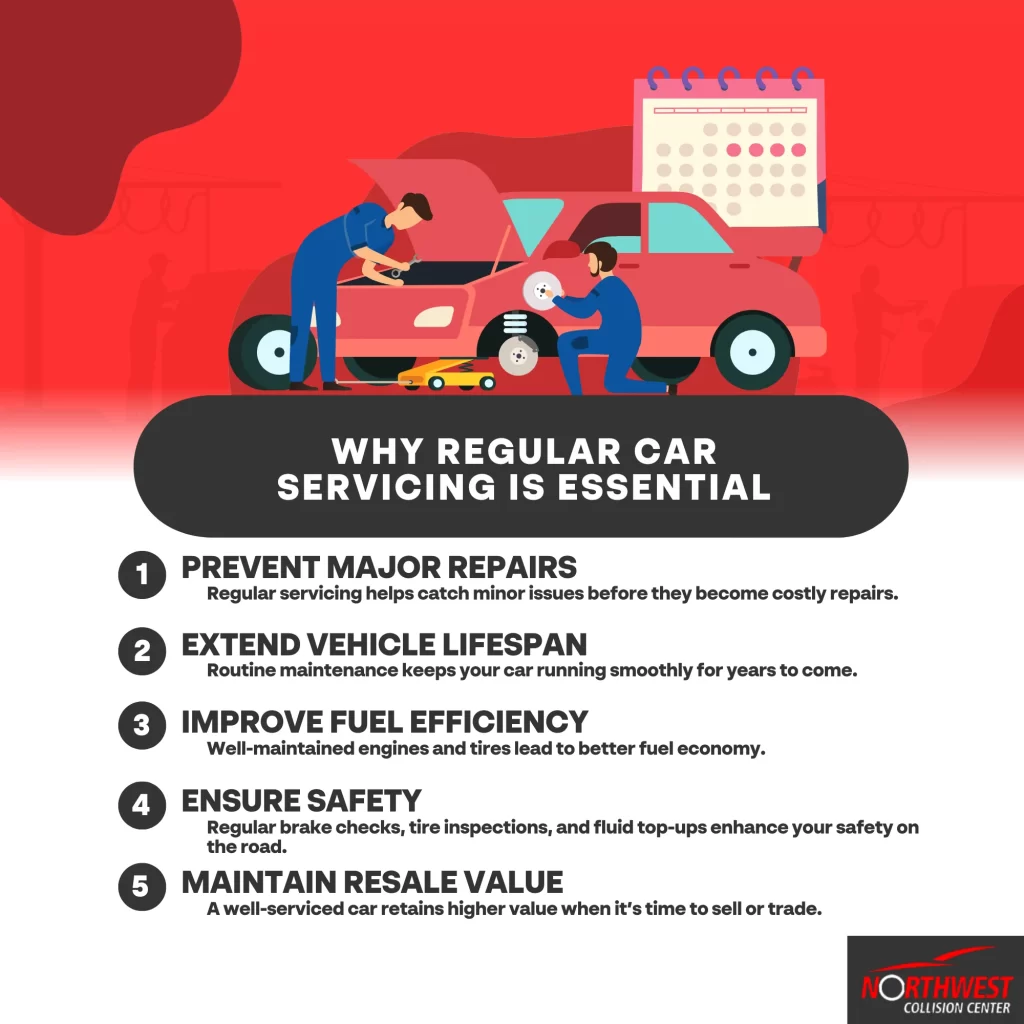You should service your car every 5,000 to 7,500 miles, depending on its age and driving conditions. For new cars, aim for every 6,000 to 7,500 miles or at least once a year. If you drive a used vehicle, consider servicing every 3,000 to 5,000 miles. Regular maintenance not only boosts vehicle performance but also helps identify potential issues before they become costly repairs. Keeping up with these services maintains your car’s value and guarantees safety on the road. There’s more you can discover about the benefits and necessities of car servicing, so keep going!

Key Takeaways
- New cars should be serviced every 6,000 to 7,500 miles, while used cars benefit from servicing every 3,000 to 5,000 miles.
- Regular servicing enhances vehicle performance and longevity, identifying potential issues before they escalate into costly repairs.
- Driving conditions and vehicle age influence servicing frequency; harsher conditions may necessitate more frequent maintenance.
- Following manufacturer guidelines for maintenance ensures optimal vehicle care and extends the lifespan of the car.
- Routine maintenance not only improves fuel economy and safety but also preserves the vehicle’s resale value over time.
A short guide to car servicing
When it comes to car servicing, knowing how often to take your vehicle in for maintenance can make all the difference in its performance and longevity.
Regular car maintenance not only keeps your vehicle running smoothly but also helps identify potential issues before they become costly repairs. Typically, you should service your car every 5,000 to 7,500 miles, but check your owner’s manual for specific recommendations.
You need to take into account factors like driving conditions and vehicle age. For instance, if you frequently drive in harsh conditions, such as extreme temperatures or on rough roads, you might need to service your car more often.
Don’t forget about the servicing costs for cars, which can vary based on the type of maintenance required. Basic services like oil changes and tire rotations are relatively inexpensive, while more extensive repairs can add up.
By staying on top of your car servicing schedule, you can avoid unexpected breakdowns and maintain your vehicle’s value over time.
Make it a habit to keep track of your service history to guarantee your car remains in top condition for years to come.
The benefits of servicing a car
Servicing your car regularly provides numerous benefits that enhance both its performance and safety. By investing in auto maintenance, you’re not just keeping your vehicle running smoothly; you’re also safeguarding your investment.
Here are some key advantages of regular servicing:
- Improved Performance: Regular check-ups help guarantee your car runs at peak efficiency, which can boost fuel economy.
- Increased Safety: Routine inspections can identify potential safety issues before they become serious problems, protecting you and your passengers.
- Cost Savings: Addressing minor issues early can prevent costly car repair and maintenance down the line, saving you money in the long run.
- Higher Resale Value: A well-maintained car often commands better servicing prices for cars when you decide to sell it, as buyers look for reliability.
How often should I service my car?
How often should you service your car to keep it running smoothly and safely? The answer varies depending on whether you own a new or used vehicle.
For new cars, manufacturers typically recommend servicing every 6,000 to 7,500 miles or once a year, whichever comes first. This routine maintenance helps maintain warranties and guarantees your car operates at peak performance.
On the other hand, servicing used cars may require more frequent attention. If you’ve got an older vehicle, consider servicing it every 3,000 to 5,000 miles. This regular servicing for cars is essential to address wear and tear, and it can prevent minor issues from escalating into costly repairs.
Pay attention to your car’s specific needs, including oil changes, tire rotations, and brake inspections. Always consult your owner’s manual for guidance tailored to your vehicle’s make and model.
Ultimately, staying proactive about servicing will extend your car’s lifespan and enhance your driving experience. Remember, whether your car is new or used, regular maintenance is key to keeping it in top shape.
What will you need to bring to a service?
Preparing for a service appointment involves gathering a few essential items to guarantee everything goes smoothly.
When you take your car in for servicing, having the right documents and information on hand can save you time and help you understand the servicing costs cars may incur.
Here’s what you should bring:
- Owner’s Manual: This contains crucial information on when do cars need servicing and specific requirements for your model.
- Service History: Keep a record of previous services, as this helps the technician identify patterns and potential issues.
- Identification and Insurance Information: These documents may be required for verification and processing any insurance claims.
- List of Concerns: If you’ve noticed any unusual sounds or issues, jot them down to discuss with the technician.
Frequently Asked Questions
What Factors Influence the Frequency of Car Servicing?
Several factors influence how often you should service your car, including its age, mileage, driving conditions, and manufacturer recommendations. Regular maintenance guarantees safety, performance, and longevity, helping you avoid costly repairs down the line.
Can I Service My Car Myself Instead of Going to a Shop?
You can service your car yourself, but make certain you have the right tools, knowledge, and parts. While DIY can save money, professional technicians offer expertise, precision, and assurance that your vehicle’s safety and aesthetics are maintained.
How Do I Know if My Car Needs Immediate Servicing?
To know if your car needs immediate servicing, watch for unusual noises, warning lights, or fluid leaks. Trust your instincts; if something feels off, it’s best to consult a professional technician for a thorough check.
Are There Specific Signs Indicating a Need for Urgent Repairs?
Your car’s warning lights are like a lighthouse guiding you through foggy waters. If you notice strange noises, fluid leaks, or vibrations, it’s essential to address these signs promptly for safety and performance.
What Should I Do if I Miss a Scheduled Service?
If you miss a scheduled service, don’t panic. Contact your service center to reschedule promptly. They’ll help assess any potential issues and guarantee your vehicle remains safe and reliable for your driving needs.
Conclusion
In summary, regular car servicing is essential for keeping your vehicle in top shape and ensuring your safety. Did you know that cars that receive consistent maintenance can last up to 200,000 miles or more? By sticking to a service schedule and staying alert to warning signs, you can enhance your driving experience and avoid costly repairs down the line. So, make servicing a priority, and enjoy the peace of mind that comes with a well-maintained car!










